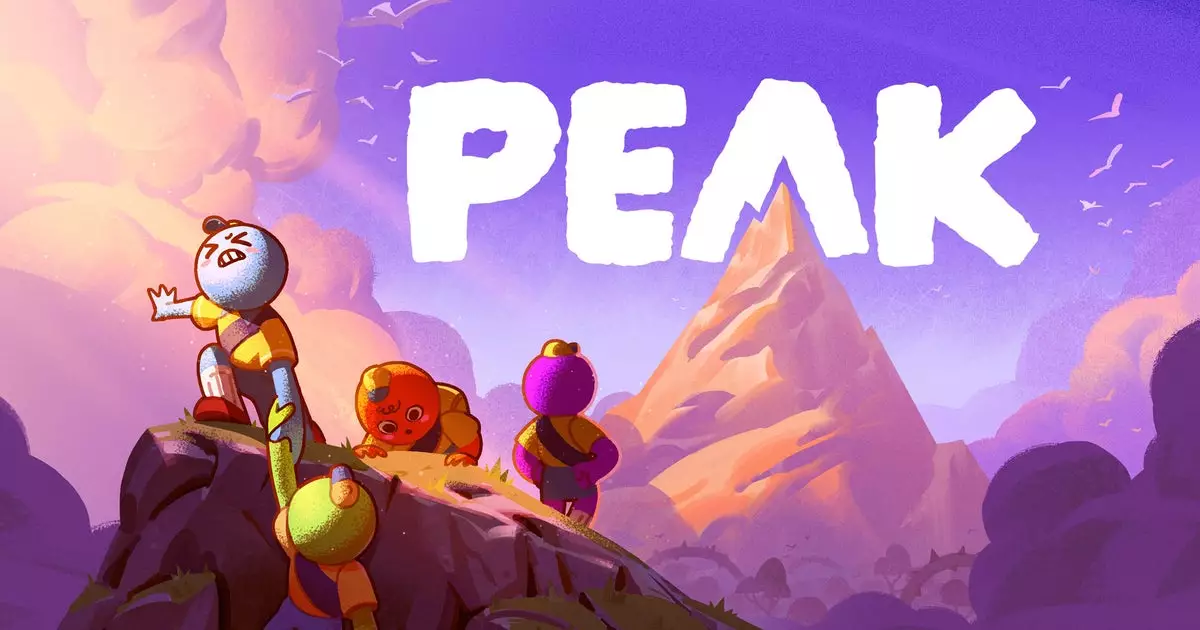In the competitive world of indie game development, inspiration can strike in unexpected places, sometimes even in a hot tub. For the developers behind “Peak,” an innovative co-op game about mountain climbing, this unusual inception story is just the beginning. The team at Aggro Crab, eager to outshine their peers, channeled feelings of jealousy and competitiveness when they witnessed the success of a different team, Landfall, who had struck gold with their own quick development cycle. What began as a vague concept turned into a passionately crafted title, showcasing the ability of a dedicated team to transform emotions into a creative force.
Having struggled for years with the arduous process of developing a larger game, the desire for a change as well as a challenge became the driving motivation for Aggro Crab. The idea for Peak was initially pitched during a light-hearted moment but evolved into a fully-fledged project that combined collaborative interplay with whimsical exploration. The developers leaned into the acknowledgment that sometimes an unconventional starting point can lead to groundbreaking results.
The Allure of Collaboration
Collaboration in game development is often romanticized, but what Peak demonstrates is the raw power of working closely, both physically and creatively, with others. The decision to jam together in Korea presented a unique opportunity: a finite timeframe and an inspiring setting where the sparks of innovation could fly unbridled. The team rented an Airbnb, creating a shared workspace that turned into a hub of creativity and camaraderie.
The environment they cultivated—characterized by brainstorming sessions and shared meals—became a transformative aspect of their development process. Embracing the chaos and excitement inherent to game jam culture, they were able to emphasize teamwork to foster a trailblazing project in a way they hadn’t anticipated. Surrounded by the indie scene, they derived joy and energy from one another, propelling the project forward faster than any of them expected.
Beyond a Traditional Development Cycle
While one might presume that financial success is predicated on meticulous planning and exhaustive ideation, the creators of Peak have positioned themselves as a living testament to the contrary. The rapid development pace forced them to set aside the fear of failure and embrace spontaneity. This is where the tension between quality and speed is deftly navigated. The team’s experience allowed them to harness risks and produce a coherent gaming experience—even with time constraints.
This case starkly contrasts the usual game development narrative that insists on long planning sessions and extensive feedback loops. The success of Peak not only provides a refreshing blueprint for prospective developers but also highlights the potential of flexibility in creative processes. Passion, creativity, and collaboration intertwined to produce a product resonating with players—sold in heaps and won over by a simple yet ingenious premise.
A Journey Fueled by Emotion
Another interesting aspect of Peak’s creation is the emotion-rich source from which it sprang. As Nick Kaman aptly noted, jealousy played a pivotal role in the spark that ignited this project, framing it in a lighthearted yet earnest reflection of the human experience within a professional setting. Instead of allowing competitive feelings to breed bitterness, they became the bedrock of a supportive endeavor, encouraging ambition and igniting enthusiasm.
What may initially seem like a whimsical journey has solid significance: the transformational power that emotions—be they jealousy or camaraderie—can have when harnessed creatively. The designers of Peak have boldly stepped into the notion that meaningful work can arise from emotionally charged environments, and that harnessing these feelings can lead to works that feel both innovative and personal.
Through the melding of these narratives, “Peak” not only serves as a thrilling gaming experience but also as a validation of the notion that in the world of game development, uncovering the right mix of collaboration, spontaneity, and emotional honesty can lead to groundbreaking success. The enthusiasm that emerged from their ambitious leap—even amidst mutual jealousy—reminds us of the wonderful anomalies life and work can present when creativity prevails over convention.

